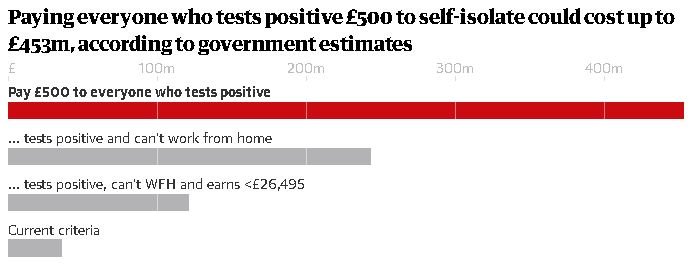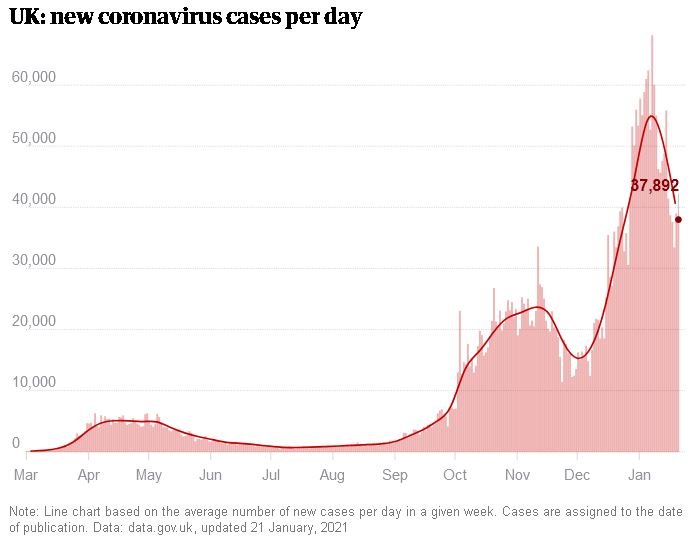
Ministers could pay £500 to everyone with Covid in England
Ministers are considering paying £500 to everyone in England who tests positive for Covid-19, in a dramatic overhaul of the self-isolation support scheme, the Guardian can reveal.
The proposed change is thought necessary because government polling found only 17% of people with symptoms are coming forward to get a test, owing to fears that a positive result could stop people from working.
The universal payment is the “preferred position” of Matt Hancock’s Department of Health and Social Care (DHSC) and would cost up to £453m a week, 12 times the cost of the current system, according to an official policy paper seen by the Guardian.
The 16-page document, dated 19 January and marked “Official Sensitive”, also proposes that police should be given access to health data for the first time to crack down on quarantine breaches.

Another recommendation is ending the £500 one-off payments to close contacts of infected people and instead rolling out nationwide self-testing, so that those who test negative can return to work.
The revamped self-isolation support scheme was drawn up by Hancock’s team to be considered by the government’s coronavirus operations committee, chaired by Michael Gove, which is expected to meet on Friday.
The UK recorded another 1,290 deaths on Thursday and 37,892 new positive cases, and there is uncertainty about whether the current restrictions will do enough to bring the pandemic under control. Boris Johnson pointedly refused to be drawn on when lockdown measures could be lifted, raising fears that the regime may not ease for months.
Financial support for people who need to self-isolate is critical to the government’s coronavirus strategy because the disease will continue to spread unless infectious people and their close contacts go into quarantine for 10 days.
However, there have been concerns that the scheme unveiled by the prime minister four months ago is excluding many people who cannot afford to self-isolate, meaning they are torn between losing earnings or spreading the disease.
The overhaul has been prompted by Cabinet Office polling indicating that only 17% of people with symptoms are coming forward for testing, according to the policy paper. It said: “Wanting to avoid self-isolation is now the single biggest reported barrier to requesting a test.”
A separate survey carried out for the DHSC, discussed in the report, found that only one in four people reported compliance with self-isolation, with 15% going to work as normal.
At present only those on a low income who cannot work from home and receive one of seven means-tested benefits are eligible for the £500 test-and-trace support payment (TTSP), excluding many small business owners, sole traders, self-employed workers and parents whose children have been told to self-isolate. Councils are given an additional pot of “discretionary” funding, but figures released by Labour this week showed that three-quarters of applicants were being rejected.
An official review of the scheme has concluded that it excludes too many people, has created a “postcode lottery” around England, and that only one in four of those eligible have received financial support – about 50,000 people in total – because the application process is too complex.
It proposes four options to expand the programme. The most generous is paying £500 to anyone who tests positive. The report says: “Anyone who tested positive for Covid-19, irrespective of their age, employment status or ability to work from home, would be eligible for TTSP. This would be straightforward for local authorities to administer, though it would lead to significantly greater volumes of applications than under the current scheme.”
Describing the universal payment as “the preferred DHSC position,” officials estimate it would cost up to £453m a week if there were 60,000 cases a day – 12 times the current cost of £36.5m a week. It would cost £340m a week if there were 45,000 infections a day, as at present.

A second option is paying the lump sum to those who test positive and cannot work from home, costing up to £244m a week. The third option is paying those earning less than £26,495 a year or on means-tested benefits, at a cost of £122m a week. The fourth proposal is keeping the current system but “significantly” expanding the discretionary funding to councils.
The policy paper says “a more radical approach” would be paying people their usual earnings instead of a £500 lump sump, but it would be difficult to assess the earnings of those on zero-hours contracts, agency workers and the self-employed and therefore that option is not recommended.
The proposal to end £500 payments to the close contacts of infected people and instead introduce regular nationwide at-home lateral flow testing would save the government £79m a week if cases were at 60,000 a day, according to the report. However, the Medicines and Healthcare products Regulatory Agency has cautioned against using self-tests as a “green light” to avoid self-isolation. Any nationwide scheme would need to be clinically approved.
Another proposed change likely to be controversial is to give individuals’ health data to the police to prove that someone has tested positive for Covid-19, making it easier for them to be prosecuted.
In October it emerged that police could request information about whether someone was supposed to be self-isolating, but “no testing data or health data”. The official paper says the current enforcement approach is “difficult to implement” and that police should be given health data to distinguish between people who have tested positive and those required to self-isolate because they are a contact.
It adds: “Contrary to previous assurances given to the public, this will mean sharing health data (ie an indication of who has tested positive for Covid-19) with the police if someone is reported to have breached their legal duty, but this is considered a necessary and proportionate measure – and data-sharing agreements will provide that the information is not used for any other purposes.”
A DHSC spokesperson said they would not comment on leaks, but said: “We are in one of the toughest moments of this pandemic and it is incumbent on all of us to help protect the NHS by staying at home and following the rules.
“All local authorities costs for administering the test-and-trace support payment scheme are covered by the government, and each authority is empowered to make discretionary payments outside of the scheme. Fifty million pounds was invested when the scheme launched, and we are providing a further £20m to help support people on low incomes who need to self-isolate.
“We also recognise the impact of the pandemic on people’s mental health and wellbeing which is why mental health services have remained open throughout the pandemic.”










